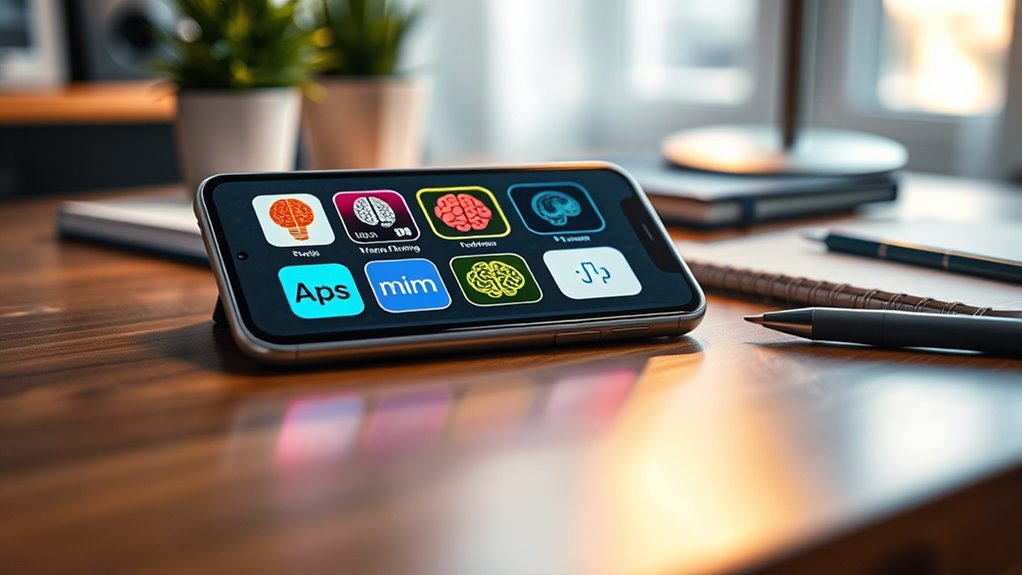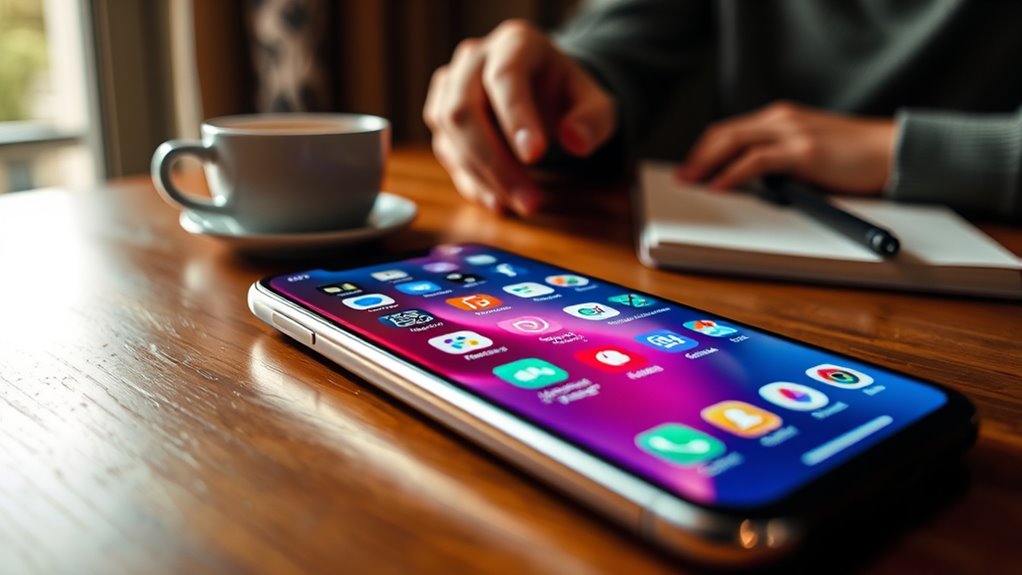Mental fitness apps can be fun and motivate you to stay sharp, but their overall impact on boosting cognition is still debated. While they offer targeted exercises to improve skills like memory and focus, benefits often stay limited to specific tasks rather than general intelligence. They work best as part of a balanced routine that includes sleep, healthy eating, and social activity. Want to uncover how to get the most out of these tools? Keep exploring for helpful insights.
Key Takeaways
- Brain games can boost task-specific skills but may not significantly improve overall intelligence or everyday cognition.
- They support mental routines and resilience, especially during stressful periods or cognitive decline.
- Evidence for broad, lasting cognitive benefits is mixed; improvements are often limited to practiced tasks.
- Using mental fitness apps should complement other healthy habits like sleep, nutrition, and social engagement.
- They are useful tools but not substitutes for comprehensive mental wellness strategies or professional guidance.

Have you ever wondered how technology can boost your mental well-being? Mental fitness apps have become increasingly popular, promising to sharpen your mind and improve your cognitive abilities. These apps often feature brain training exercises designed to target specific mental skills, such as memory, attention, problem-solving, and reasoning. The idea is to engage in daily or regular cognitive enhancement activities that could potentially make you sharper over time. But do they really work, or are they just a distraction?
When you start exploring these apps, you’ll notice they often incorporate gamified challenges that make mental workouts engaging. The concept behind brain training is to push your brain’s limits, encouraging neural plasticity—the brain’s ability to adapt and rewire itself. This approach suggests that just like physical workouts strengthen muscles, mental exercises can enhance your cognitive function. While some studies show promising results, the evidence remains mixed. A number of experts argue that benefits are often limited to the specific tasks you practice, meaning improvements might not transfer broadly to everyday mental tasks. Still, many users report feeling more alert, focused, and mentally agile after consistent use.
Gamified brain training can boost alertness and focus, but benefits may be limited to specific tasks.
Using mental fitness apps for cognitive enhancement can also serve as a way to establish a routine that keeps your brain active. If you’re in a phase of life where mental sharpness matters—like studying for a big exam, preparing for a job interview, or simply trying to stay mentally fit as you age—these apps can be valuable tools. They provide structured activities, track your progress, and motivate you to continue challenging yourself. In that sense, they’re not just entertainment; they’re a way to actively work on your mental resilience.
Additionally, understanding the role of contrast ratio in visual clarity can help you select apps with optimized interfaces that reduce eye strain and improve focus during exercises. However, it’s important to keep realistic expectations. Brain training and cognitive enhancement through these apps aren’t magic bullets. They won’t instantly turn you into a genius or solve every mental challenge you face. Instead, think of them as part of a broader mental fitness routine that includes proper sleep, nutrition, physical activity, and social engagement. Incorporating these apps can complement other healthy habits and help you stay motivated to maintain your mental health.
In the end, whether brain games are worth your time depends on your goals and how you approach them. If you’re curious about boosting your cognitive skills, trying out different mental fitness apps can be a fun and engaging way to challenge yourself. Just remember to stay critical—use these tools as a supplement, not a substitute, for a balanced mental wellness strategy.
Frequently Asked Questions
Do Mental Fitness Apps Improve Long-Term Cognitive Health?
You’re wondering if mental fitness apps can boost long-term cognitive health. While they may enhance brain plasticity and sharpen your skills temporarily, evidence suggests they don’t substantially prevent cognitive decline over time. To truly support long-term health, engage in diverse activities like physical exercise, social interaction, and continuous learning. These habits better strengthen your brain’s resilience against aging and cognitive decline than relying solely on brain games.
Are Brain Training Apps Suitable for Children or Seniors?
Think of brain training apps like a playground—they need age-appropriate challenges and accessibility features to be truly effective. For children, engaging, colorful games boost learning, while seniors benefit from simple interfaces and memory exercises. I saw my grandma enjoy a game that improved her focus, proving these apps can suit all ages. When well-designed, they promote mental agility and inclusivity, making them a valuable tool for kids and seniors alike.
How Much Should I Use Mental Fitness Apps Daily?
You should aim to incorporate mental fitness apps into your daily routine in moderation, around 10 to 20 minutes a day. This helps you stay consistent without feeling overwhelmed. Many apps offer customization, so you can adjust difficulty and focus areas to suit your needs. Regular use enhances mental agility, but overdoing it may lead to fatigue. Find a balance that keeps you engaged and motivated over time.
Can These Apps Replace Traditional Mental Health Treatments?
You might wonder if mental fitness apps can replace traditional mental health treatments. While they can support your cognitive skills, they shouldn’t replace professional help, especially if you’re facing serious issues. Instead, consider a digital detox to reduce screen time and enhance real social interaction, which plays a crucial role in mental well-being. These apps are helpful tools but aren’t substitutes for thorough therapy or medical advice.
Are There Any Risks or Downsides to Using Brain Games?
About 60% of users worry about data privacy when using brain games, highlighting potential risks. While these apps can boost certain skills, they also pose addiction risks if you overuse them. Be cautious about sharing personal info and set limits on your screen time. If used responsibly, brain games can be beneficial, but ignoring these downsides might lead to privacy issues or dependency.
Conclusion
As you navigate the world of mental fitness apps, think of them as tools in your mental toolbox—some spark your brain like kindling, fueling your cognitive fire, while others might be just empty matches. While these apps can be helpful, they’re not magic wands. Use them wisely, like a gardener tending a delicate plant, nurturing your mind daily. With patience and the right choices, you’ll cultivate a resilient, vibrant mental garden that flourishes over time.









